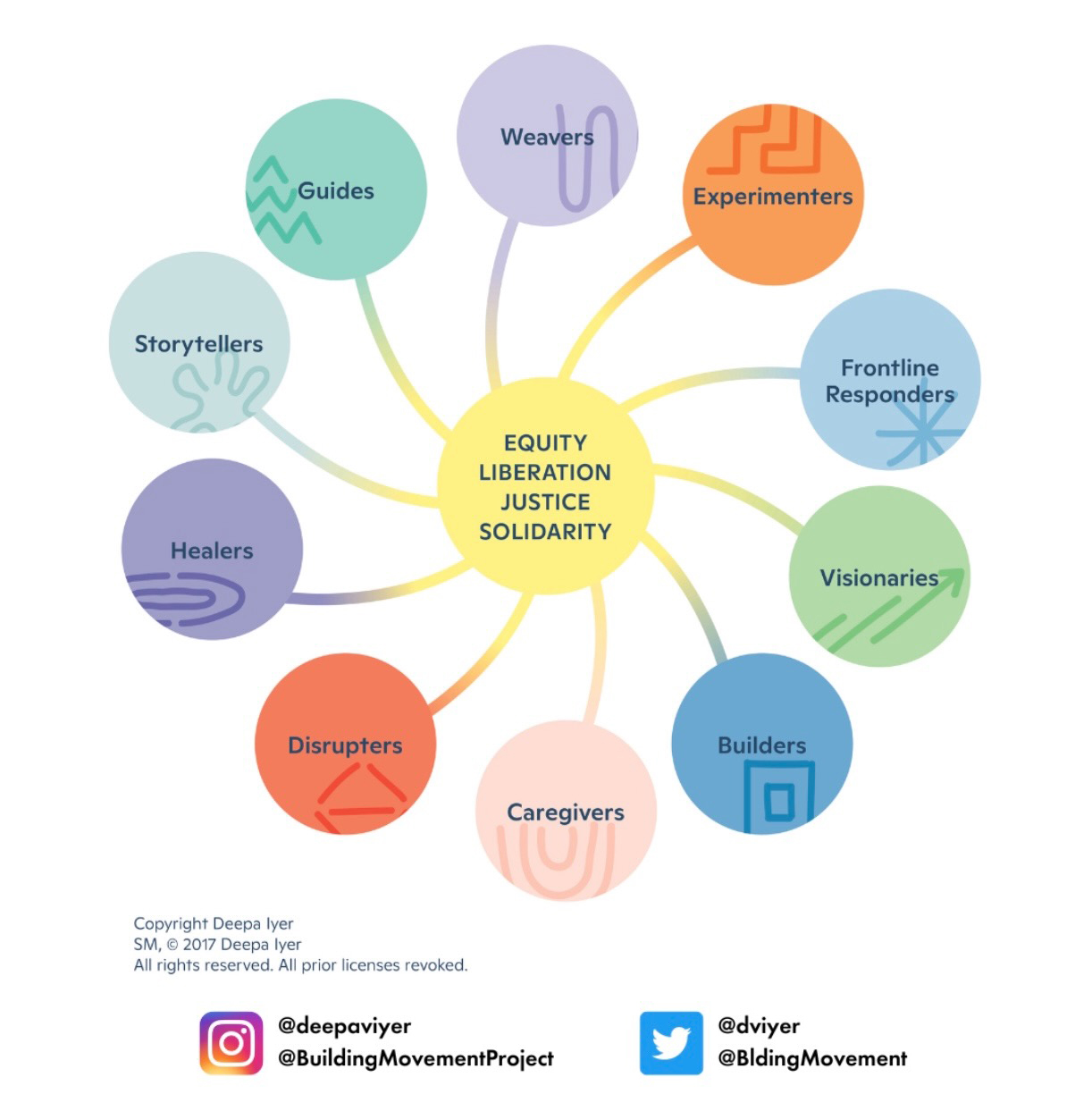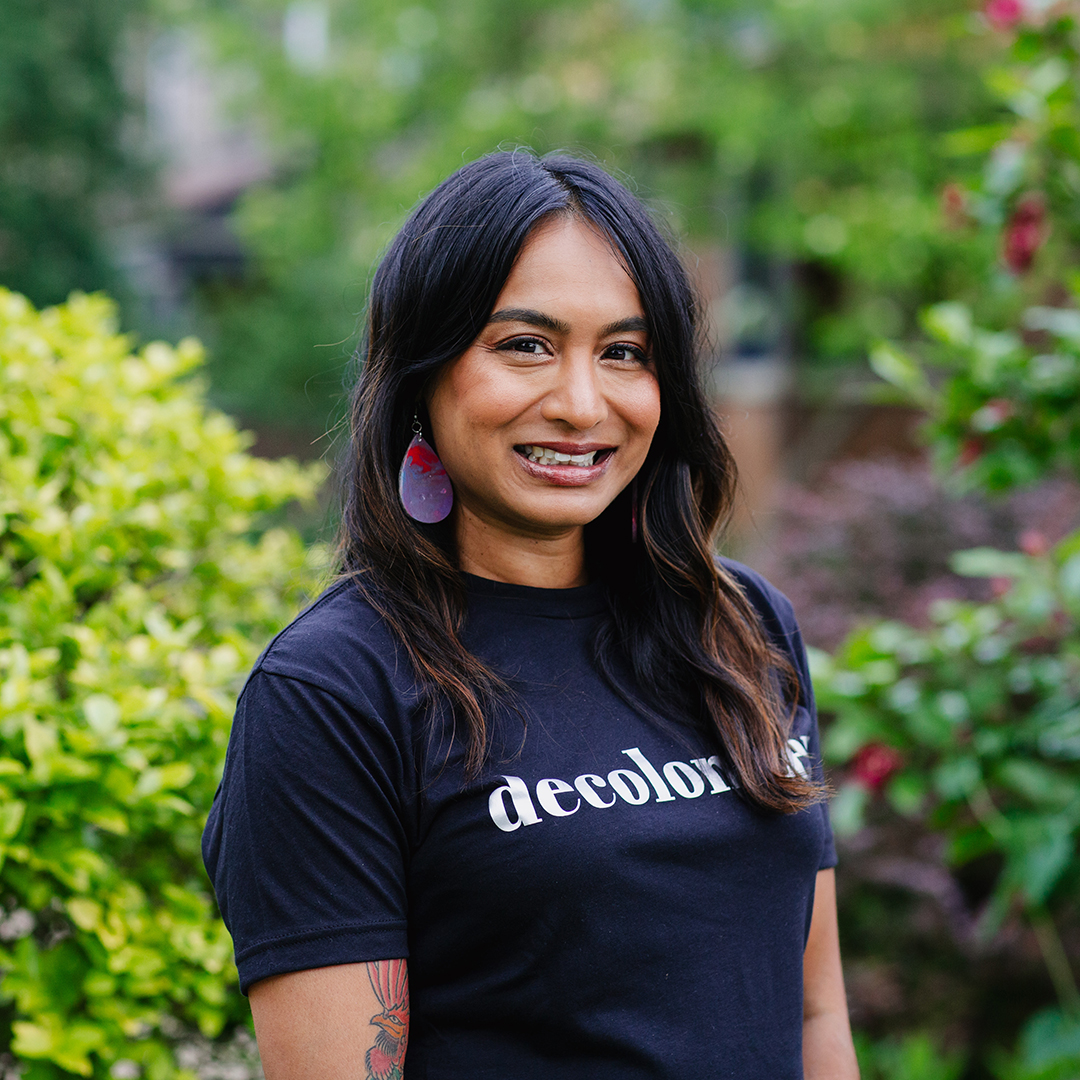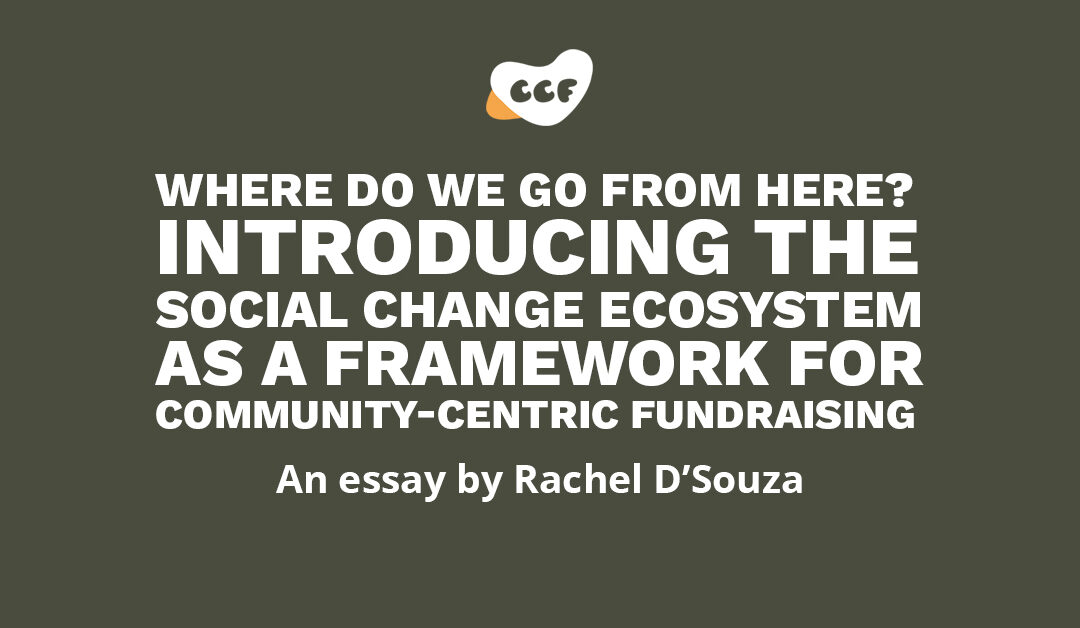By Rachel D’Souza, with gratitude to and permission from Deepa Iyer
If we know that we cannot — and should not — be everything to everyone, how will we get our communities what they need while preserving our energy for the long fight ahead? Now is the time to radically reimagine what could be when we embrace our role in the Social Change Ecosystem.
A “Next” Normal
The day after the 2024 elections in the U.S., my kids and I processed our initial feelings while on a walk through my neighborhood.
I can’t believe he won.
Can we be deported?
Do you think we should buy a gun?
Mom, are you scared?
As I did my best to comfort them, I realized how much had changed since the 2016 election. Back then, they were just five and one, barely aware of anything outside our family and their school community. But at thirteen and nine, they fully understood that this election would affect them and people they love. They were afraid — and even though I put on a brave face in front of them, so was I.
Still am.
What are we going to do? I asked myself.
Well. I knew I couldn’t show up the same ways I had 2016-2020 — it almost broke me. I knew I couldn’t spread myself too thin.
Indeed, the most painful (re)learning of that time was that we can’t do it all and when we try, we don’t do it well. Overextending ourselves, however well-intended and passionately driven, doesn’t serve our families or ourselves — and it certainly does not serve the movement.
So in those grim weeks post November 5th, I decided to focus on a new strategy. I would still seek out and celebrate the short term wins, but prioritize the strategy of mid- and long-term change. I knew I had more to learn and unlearn. I knew I’d make mistakes in pursuit of a more equitable community. And, more than ever, I knew that I’d have to trust and believe that others in my community would fill in the gaps, and that I would do the same for them.
Following the election, I wrote a Linkedin post about the “polycrisis” — a term describing a complex situation where multiple, interconnected crises converge and amplify each other, resulting in a predicament which is difficult to manage or resolve. Unlike single crises, which may have clear causes and solutions, a polycrisis involves overlapping and interdependent issues. (If there is a more accurate description for the moment in which U.S. civil society finds itself, I don’t know it.)
When in a polycrisis, organizations can’t implement a single, linear solution — at least not on our own. So how can we orient our time, talents, and energy to meet this moment as vulnerably and audaciously as possible while avoiding burnout and apathy? If we know that we cannot — and should not — be everything to everyone, how will we get our communities what they need while preserving our energy for the long fight ahead?
Now is the time to radically reimagine what could be when we embrace our role in the Social Change Ecosystem.
Introducing The Social Change Ecosystem
The social change ecosystem framework, developed by Deepa Iyer of Building Movement Projects, is a tool to clarify values, identify roles, and support organizations, campaigns, and networks committed to solidarity, justice, and equity. It has two components: shared values (embodied in the yellow circle in the middle); and ten roles that people and organizations often show up in when they are participating in social change efforts

There is a reason this concept is called an “ecosystem,” and that is because we are more effective and more sustainable in our social change work when we build connections with others.
This framework has become a tool used by numerous people and organizations, particularly during challenging moments, to find ways to engage in social change efforts more effectively, collaboratively, and sustainably.
Iyer has defined the ten roles on the map as:
- Weavers: We see the through-lines of connectivity between people, places, organizations, ideas, and movements.
- Experimenters: We innovate, pioneer, and invent. We take risks and course-correct as needed.
- Frontline Responders: We address community crises by marshaling and organizing resources, networks, and messages.
- Visionaries: We imagine and generate our boldest possibilities, hopes, and dreams, and remind others of our direction.
- Builders: We develop, organize, and implement ideas, practices, people, and resources in service of a collective vision.
- Caregivers: We nurture and nourish the people around us by creating and sustaining a community of care, joy, and connection.
- Healers: We recognize and tend to the generational and current traumas caused by oppressive systems, institutions, policies, and practices.
- Disrupters: We take uncomfortable and risky actions to shake up the status quo to raise awareness and build power.
- Storytellers: We craft and share our community stories, cultures, experiences, histories, and possibilities through art, music, media, and movement.
- Guides: We teach, counsel, and advise using our gifts of well-earned discernment and wisdom.
When starting out with this tool, she encourages individuals to reflect on the following prompts:
- What are my core values and what do they mean?
- What role(s) am I best suited to play, given my skills, innate strengths, lived experiences,
knowledge, and interests?
- Where am I stretched too thin because I am playing multiple roles in multiple contexts?
- How do I connect with an ecosystem, or organize a new one?
- Who is in my ecosystem, and how can I support them?
- What do I need from my ecosystem?
One of the most important things to understand about the Social Change Ecosystem Map is that it is a living tool. I have repeatedly turned to this tool over the last few years, using it to check in with myself and redirect my time and commitments as needed. As social currents, challenges, and opportunities have changed in that time, my roles have also shifted and changed as well.
In this phase of my contributions to the Community-Centric Fundraising Movement, I seek to live into my strengths as a Visionary, Guide, and Weaver.
So where do we go from here?
The conversation that started with my kids during our November evening walk has continued.
I picked up We Are the Builders!, a picture book by Iyer and illustrated by Romina Galotta, from one of our favorite local bookstores. Both of my children immediately identified themselves as “experimenters.”
Then, the aha moment happened.
As the three of us worked together to name who we know and where they might fit on the map, my daughter exclaimed: “Oh, mom. We’ve got this. Look how powerful we are together!”
Indeed, when we show up with our best contributions and trust our community will do the same, we open up unlimited possibilities for what change we can build together.
There is a role for everyone — and together, we’ve got this.
Where would you place yourself on the map?

Rachel D'Souza
Rachel D’Souza (she/her) is the Founder+Principal of Gladiator Consulting in St. Louis, Missouri. Through Gladiator, Rachel has combined her knowledge of organizational culture and fund development with her deep personal commitment to centering community, seeking justice and creating belonging for those who have been disenfranchised or targeted by institutions, systems, and policy.
Born to parents who immigrated to the U.S. from India, Rachel has always been passionate about bridging differences and celebrating what’s possible when we collaborate from a mindset of abundance, learning, and risk-taking. Rachel loves cooking, snuggling her kids, and Instagram.
Discover more from CCF
Subscribe to get the latest posts sent to your email.

